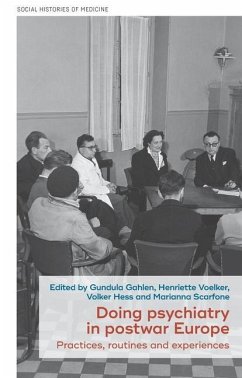European psychiatry underwent numerous transformations in the second half of the twentieth century, and a variety of practices were experienced and routinised. Doing psychiatry in postwar Europe engages with this history through a close and fresh look at the practices that contributed to reshaping the mental health field. It uses case studies from across Europe to illustrate how new 'ways of doing' transformed the field beyond the watchwords of deinstitutionalisation, introduction of neuroleptics, centrality of patients and overcoming of asylum-era habits. Through a variety of sources and often adopting a small-scale perspective, the volume takes a close look at the way new practices took shape and at how they installed themselves, eventually facing resistance, injecting new purposes, and contributing to enlarging psychiatry's fields of expertise, therefore blurring its once-more-defined boundaries. Studying psychiatry in its making and unmaking in the second half of the twentieth century allows one to see it less as a science grounded in theory or laboratory research than as an art of doing, which can be understood as the outcome of practices. Giving significant attention to the actors of the psychiatric field, from doctors, patients and nurses to families, as well as other figures such as architects and sociologists, Doing psychiatry contributes to a renewal of the historiography of contemporary European psychiatry.








